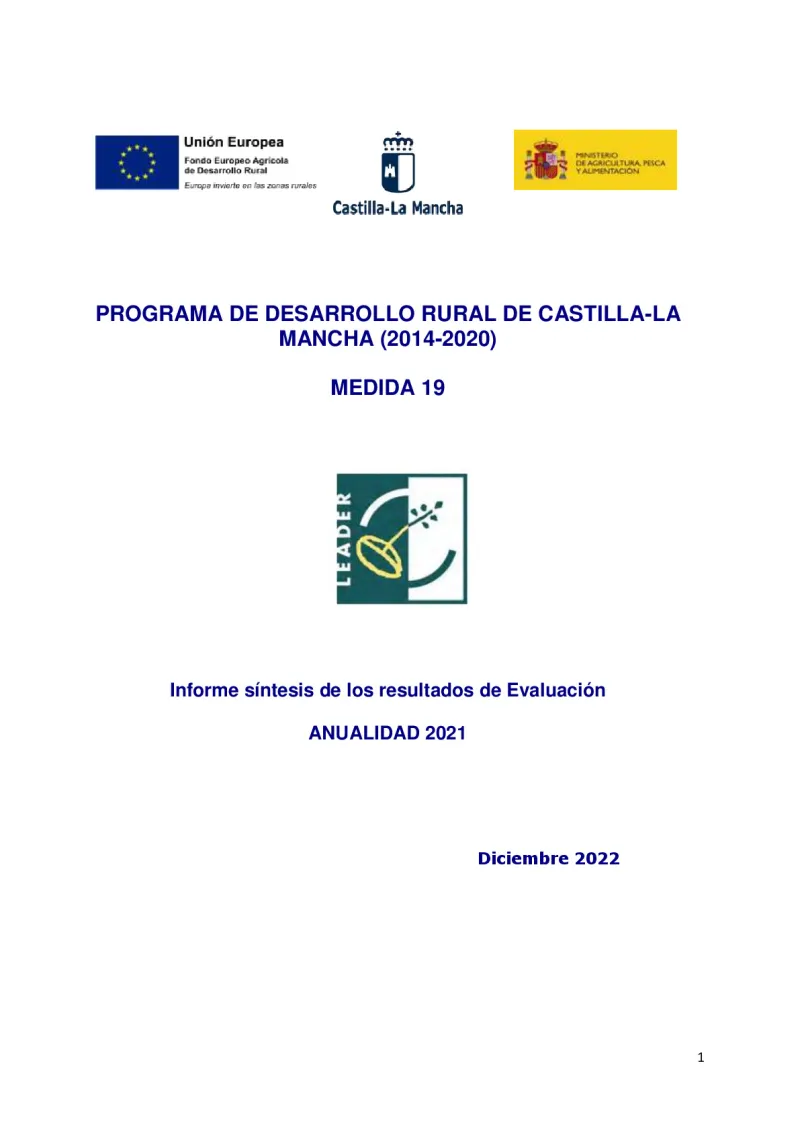Synthesis report on LEADER support to local development
This report analyses the results of the evaluations carried out by Local Action Groups (LAGs) on the implementation of Local Development Strategies (LDS) and the activities that LAGs promoted during the COVID-19 pandemic.
- Spain
- 2014-2022
- Cross-cutting impacts


The evaluation concerns the 2014-2020 Rural Development Programme (RDP) of Castilla-la-Mancha and covers the annuity of 2021. Published in 2022, it was commissioned by Spain's General Directorate of Rural Development of the Regional Ministry of Agriculture, Water and Rural Development.
The LAGs annually carry out evaluations to identify the achievements of their LDS and to provide useful information for the evaluation of the achievements of the RDP in the field of territorial development.
This document aims to extract relevant information from the evaluations carried out by the LAGs, with a special focus on the evolution of LDS implementation and the activities that LAGs have promoted during the COVID-19 pandemic.
The report presents the synthesis of the results of the LDS evaluations, together with additional information provided by the 29 LAGs of Castilla-La Mancha, with a focus on analysing the extent that LDSs were able to respond to the needs that emerged during the COVID-19 pandemic. To perform the LDS evaluations, a common evaluation matrix was proposed to the LAGs, which is built around the evaluation question: "To what extent has the LEADER approach been able to address the needs arising from the pandemic in the region?".
The answer to this question was envisaged through the analysis of three different criteria: the ability to promote projects that meet newly emerged needs, the need for amendments of the strategy to be able to respond to these needs and projects, and the work of the LAGs to determine whether the LDS has been affected.
This methodological proposal was indicative and not mandatory, with each LAG able to choose the judgement criteria and indicators they considered relevant to answer the evaluation question.
The main challenges of this synthesis report derived from the heterogeneity of the LAG reports, both on the contents side and the way to structure information. Some of the LAG reports addressed additional topics beyond the common theme proposed for this annuity, and in some cases, the objective of the assessment was already assessed in 2021. These results have been considered to the maximum extent possible.
The conclusion is that although LEADER’s implementation slowed down during 2020, it increased again in 2021. The activities of the LAGs have not stopped during this period, although in most cases they have been affected by the pandemic, reflected both in the number of projects being paid, in total public expenditure and in the number of created and maintained employment.
All LAGs perceived that Measure 19 is not designed with sufficient flexibility to react with the speed required to address new needs arising from a pandemic.
The implementation of the LDS has suffered a significant decrease in 2020. The positive drivers to maintain implementation were the fact that projects originated from calls before 2020, as well as the implementation of administrative measures, the increased flexibility, and the work of animation and advice carried out by LAGs.
The implementation of the strategies has been favoured both by the measures promoted by the administration and the work of the LAGs. However, the implementation of the strategy has been influenced by the pandemic and related consequences.
LAGs highlight a strengthening of animation and revitalisation activities during the pandemic, with adaptations to new priorities emerging. Their proximity to rural populations has allowed them to act more efficiently and timely. They have also adapted a way of working, changing from face-to-face to virtual work, losing closeness and direct contact, but gaining the possibility of reaching more people. However, part of the population has difficulties using new technologies and tools.
To meet the needs of rural areas, projects not only supported by Measure 19 have been developed. LAGs also have an important role in providing advice, including on the design of initiatives supported by Measure 19, redirecting the initiatives of the promoters to other funds and supporting projects financed from other sources, thus increasing the effectiveness of entrepreneurship in the region and realising their existing potential.
It is important to underline the success achieved throughout LEADER in generating an image that LAG is a credible entity in the region, resulting in territorial cohesion. This led municipalities to turn to the LAGs during the pandemic with the aim to organise actions that affected all municipalities or specific groups within the region.